As 2024 comes to a close, much of the month will be dedicated to wrapping up the year in cinema with a plethora of year-end features (bookmark here for those), but let’s take a deeper look at the December line-up. Featuring some of the most-praised films of the year, including my favorite shortest and longest works, and much more, it’s a great time for holiday movie-going.
We should note also that a number of notable films are getting Oscar-qualifying runs before the end of the year (including Hard Truths, I’m Still Here, The Last Showgirl, and Armand), which we’ll feature on this in proper when they get their official releases.
15. A Complete Unknown (James Mangold; Dec. 25)
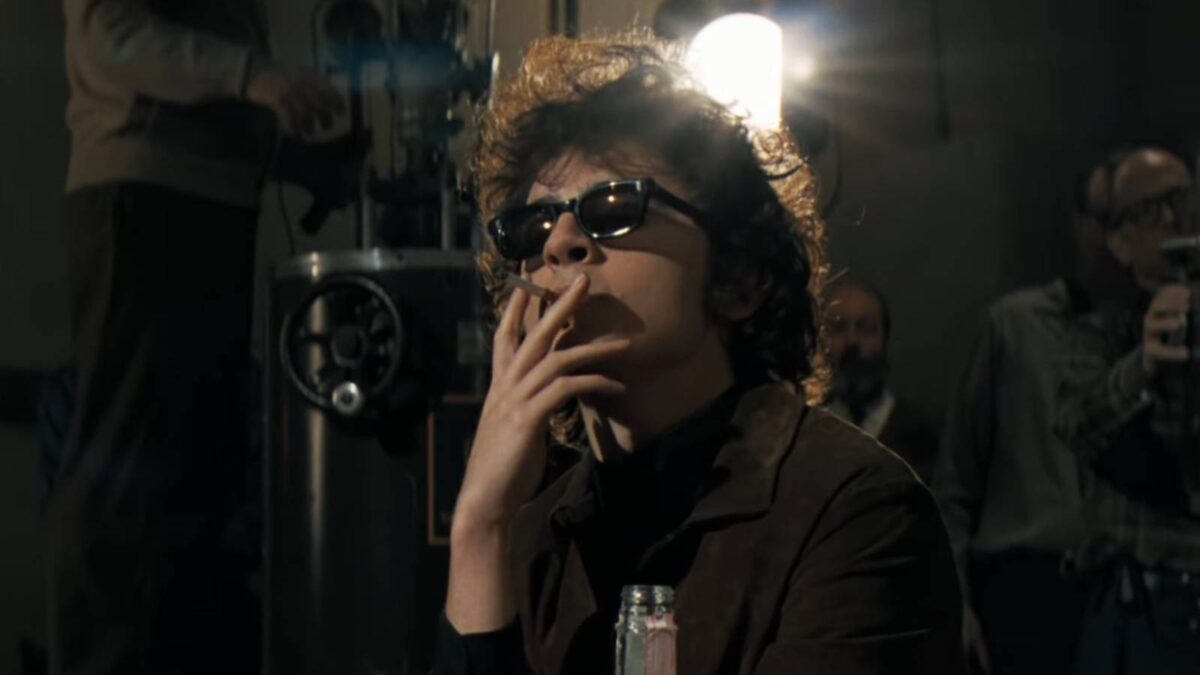
Nabbing the last spot on this for sheer fascination with Bob Dylan alone and not much else, James Mangold in biopic mode is often far less interesting than some of his other work. However, with what seems to be a committed Timothée Chalamet performance and early praise for Edward Norton, Elle Fanning, and Monica Barbaro, it sounds like it’ll pass the time just well enough on Christmas week.
14. Santosh (Sandhya Suri; Dec. 27)
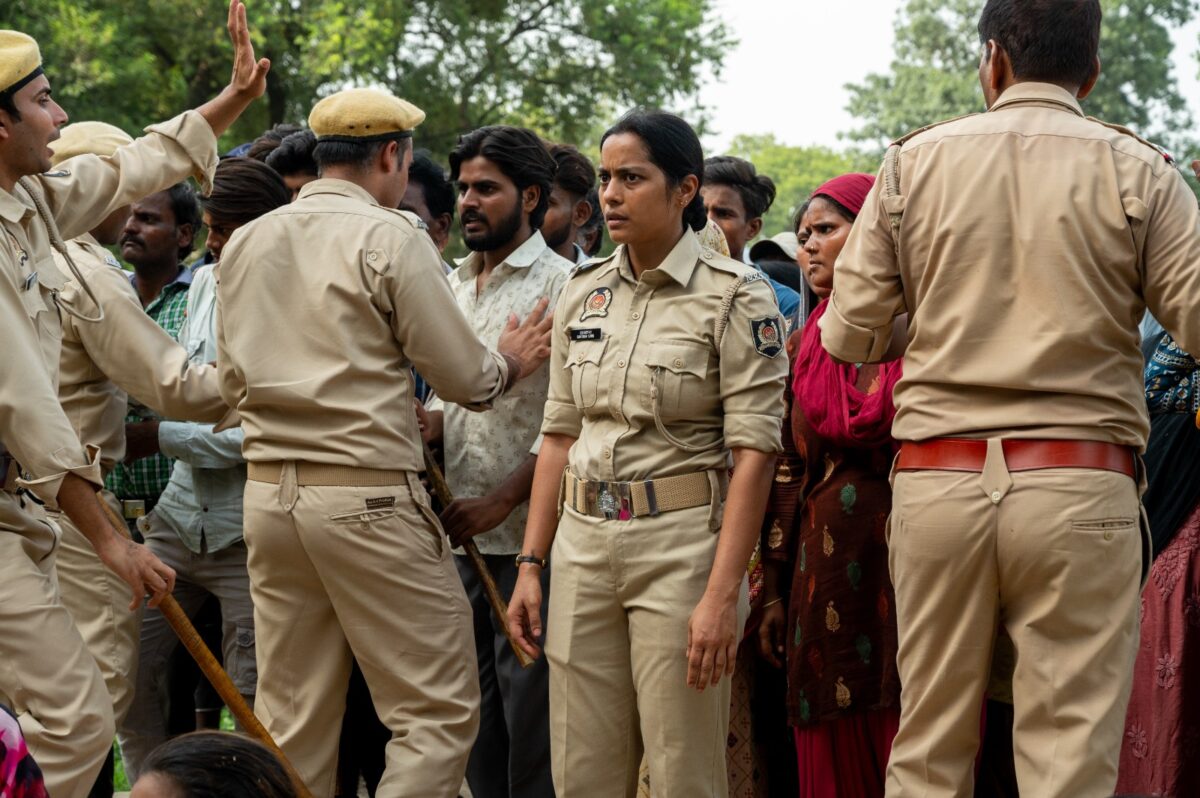
Premiering at Cannes in the Un Certain Regard section earlier this year to much acclaim, Sandhya Suri’s narrative directorial debut was recently selected as U.K.’s official Oscar entry. Now set for a release beginning at the end of this month, the film follows a widow who must take her late husband’s job as a police officer. A compelling look at police corruption and the emotional and physical sacrifices of betraying morals in the pursuit of so-called justice, Santosh is formally spare but worthwhile for its powerful ending.
13. The Girl with the Needle (Magnus von Horn; Dec. 6)
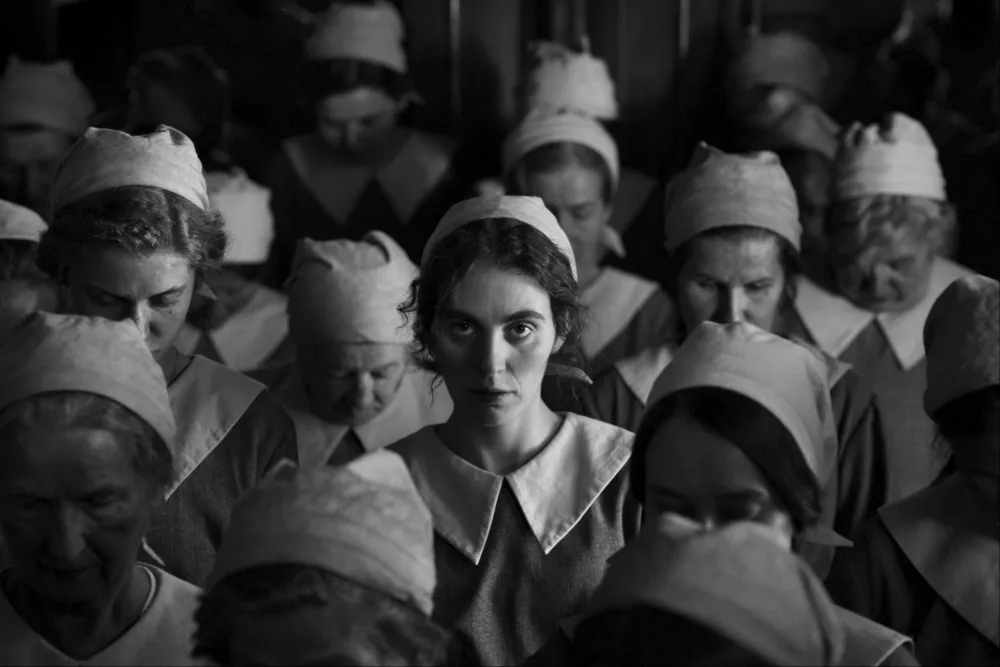
After making a splash with his influencer satire Sweat, Swedish director Magnus von Horn returned to Cannes with the black-and-white drama The Girl with the Needle. Savina Petkova said of Denmark’s Oscar entry in her Cannes review, “Teaming with co-writer Line Langebek, van Horn takes a true story and weaves many obstacles, encounters, and disappointments to make sure we see Karoline as a multifaceted character, even if she barely speaks. It’s not that she’s deliberately quiet or scheming in any way; her reticence to talk instead confirms a lack of faith in life as it is. Girl‘s period setting––1919 in a post-WWI Copenhagen––may be a century removed from our times, but its atmosphere weighs on you just as today’s world might. With old wars supposedly ending and new ones brewing, home evictions, poverty, and lack of abortion rights, Scandinavia in the 1920s can terrifyingly mirror many parts of Europe in the 2020s. The Anthropocene looms over The Girl with the Needle, which is the best thing a period piece can hope for: a knowing, truthful look at the past from the vantage of our present.”
12. The Order (Justin Kurzel; Dec. 6)
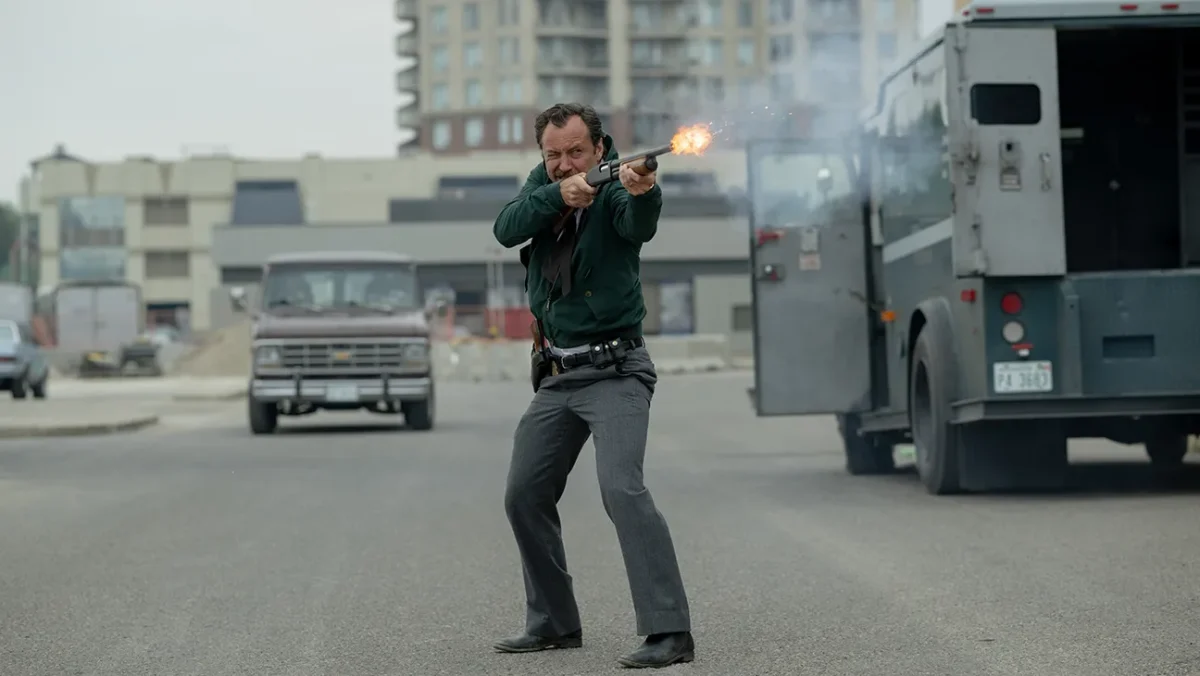
At quite a steady clip, Justin Kurzel followed True History of the Kelly Gang and Nitram with The Order, a gritty crime drama that’s certainly his best film since the debut Snowtown. Starring Jude Law, Nicholas Hoult, Tye Sheridan, Jurnee Smollett, Alison Oliver, and Marc Maron, the film tells the true story of FBI agents tracking down robberies carried out by white supremacists. Luke Hicks said in his review, “Australian native Kurzel has finally––as was inevitable at his climbing rate––begun telling stories stateside, but the move to the American West simply amounts to a setting shift. The film doesn’t feel foreign to his other work––a compliment or a dig, depending on how you read it. For one, The Order bears its fair share of clichés. You can guess how it’ll end. The boilerplate crime-thriller framework follows that of his past films, which don’t stray from the formula either.”
11. Carry-On (Jaume Collet-Serra; Dec. 13 on Netflix)
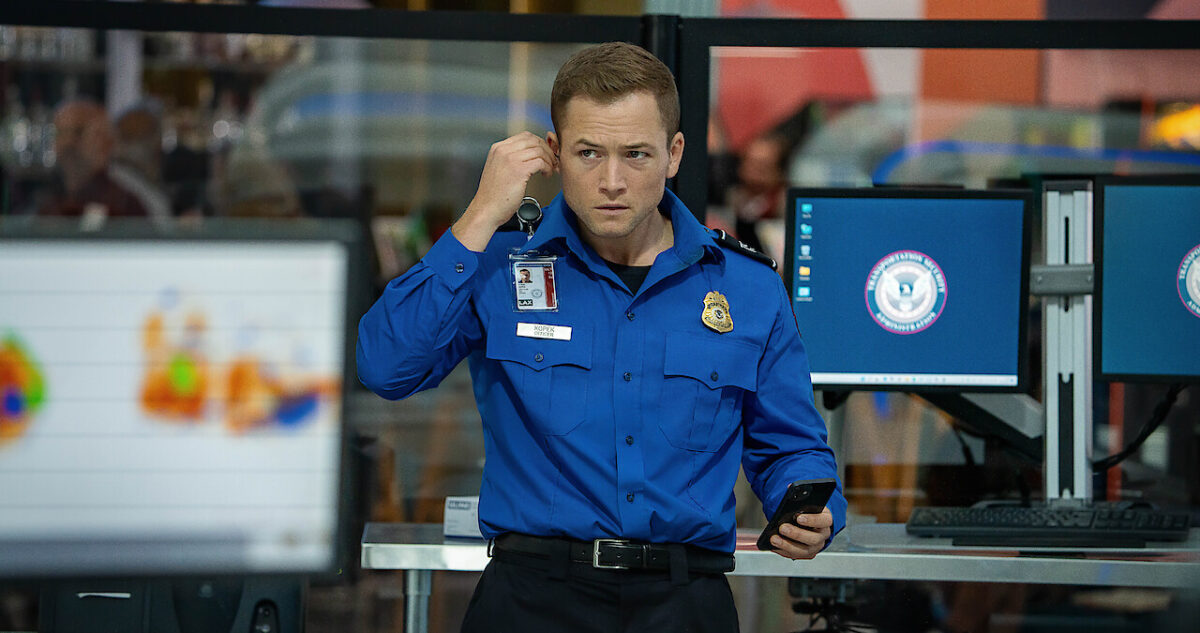
After getting sucked into the Dwayne Johnson abyss of tentpole filmmaking, Jaume Collet-Serra is getting back to what he knows best: thrillingly calibrated B-movies. Next spring will see the theatrical release of his Danielle Deadwyler-led horror thriller The Woman in the Yard and he’s already started shooting a Cliffhanger remake, but first he’s teamed with Netflix for Carry-On. Returning to the aviation-centered thriller after Non-Stop, his latest film follows a young TSA agent as he fights to outsmart a mysterious traveler who blackmails him into letting a dangerous package slip onto a Christmas Eve flight.
10. Gaucho Gaucho (Gregory Kershaw, Michael Dweck; Dec. 1 on Jolt)
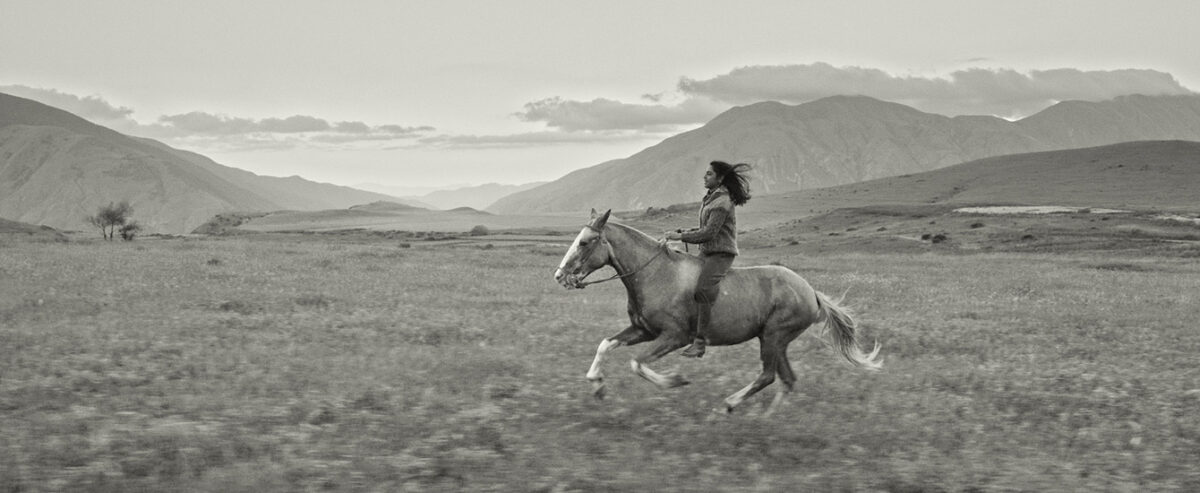
Bringing a pristine level of craft with their portraits of subcultures in The Last Race and The Truffle Hunters, Gregory Kershaw and Michael Dweck turned their vision to the world of gauchos for their latest project. Returning to Sundance for a third time earlier this year, Gaucho Gaucho beautifully captures this particular way of life in Argentina. Jose Solís said in his Sundance review, “The black-and-white cinematography brings out unexpected beauty and contributes to the sense that we’re watching timeless figures––ghosts, even. Because these ghosts remain within the confines of their culture by choice, they interact with modern beings in a limited way. A gaucho hat on a head stands out almost comically in the middle of a school classroom; it’s even more surprising to discover it’s not a boy but a girl, Guada, who listens attentively to her teacher’s reminder that she is supposed to wear her uniform to school. The girl replies she is a gaucho and feels more comfortable in her traditional attire. Throughout the film we learn Guada is also defying the norm at home by taking part in traditions usually reserved for men.”
9. Oh, Canada (Paul Schrader; Dec. 6)
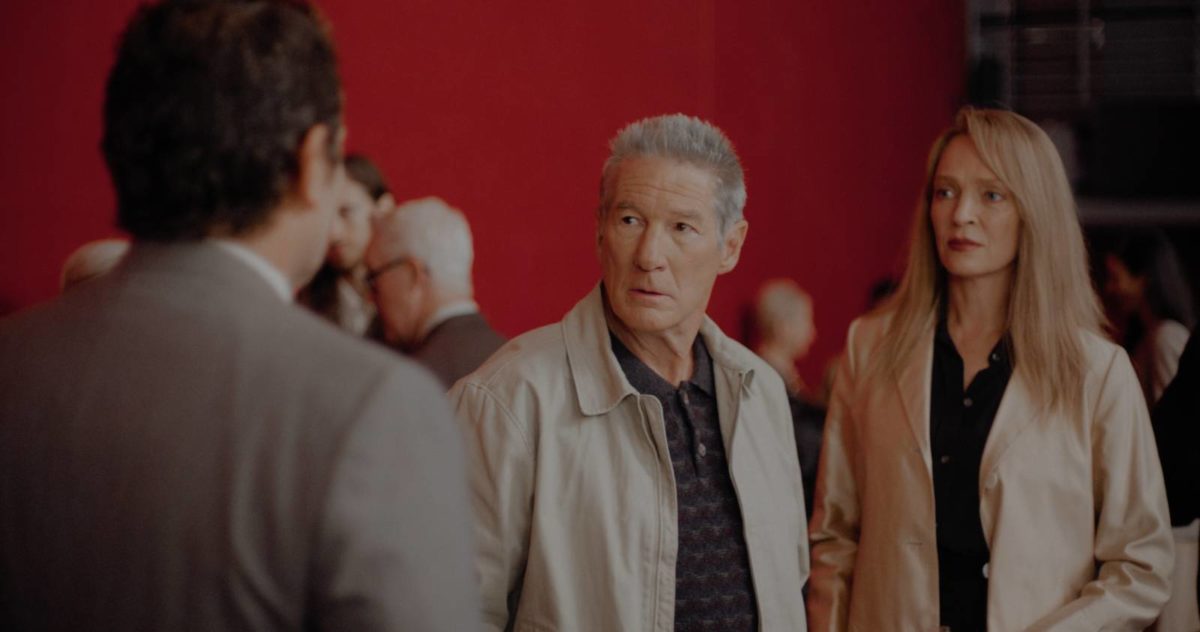
After his trio of “Man in a Room” films, Paul Schrader has switched gears with the poignant drama Oh, Canada. Reteaming with his American Gigolo star Richard Gere, the film follows a famed Canadian documentary filmmaker who gives a final interview to one of his former students to tell the whole truth about his life. Rory O’Connor said in his review, “It’s the first time the director has worked with Richard Gere since the mutually beneficial success of American Gigolo 44 years––a moving and poignant choice given the wildly diverging paths they have been over that time. The actor was 31 when Gigolo came out, about to be thrust to the top of the A-list. Never comfortable in the sunnier parts of Hollywood, Schrader would use the film’s success to plug away for as long as he could with his own idiosyncratic brand of filmmaking. That their paths have convened again here, with Schrader rejuvenated (loving life as the elder statesman of the New York scene) and Gere without a solid role in years, is itself a poignant narrative. That they’ve done so on a story about a filmmaker reassessing his own legacy is even more compelling.”
8. Vermiglio (Maura Delpero; Dec. 25)
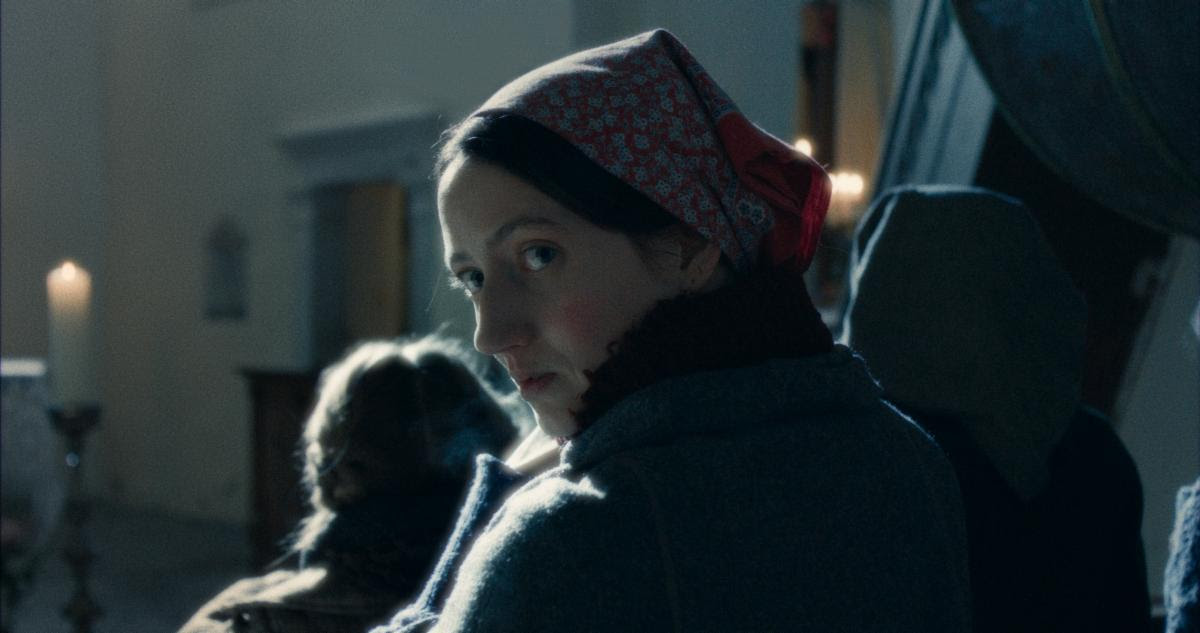
Italy’s Oscar entry Vermiglio, about the trials and tribulations of a family living in a small mountain community during wartime, is one of the most starkly beautiful films of the year. Lucia Ahrensdorf said in her AFI Fest review, “Vermiglio is set in the eponymous alpine village during the waning days of WWII. Maura Delpero’s film, gorgeously shot by Leviathan cinematographer Mikhail Krichman, is a slow-moving fable that unfolds as a novelistic series of pastoral tableaus. The short chapters evoke Balzacian poetic realism and recall the sensual textures of last year’s The Taste of Things. But unlike that film, which exuded autumnal warmth and celebrated pleasure––therefore freedom––Vermiglio‘s stark, wintery beauty comes at the price of its characters’ desires. The painterly frames physically constrain subjects, especially women who suffer pointedly under the social restrictions of this time and place.”
7. Babygirl (Halina Reijn; Dec. 25)

Premiering with much fervor at the Venice Film Festival, Halina Reijn’s Bodies Bodies Bodies follow-up Babygirl finds Nicole Kidman playing a high-powered CEO who puts her career and family on the line when she begins a torrid affair with her much-younger intern (Harris Dickinson), and which earned her Best Actress at the festival. Savina Petkova said in her review, “It’s not too early in the festival to say Reijn wrote and directed one of––if not the––most compelling films of this year’s Venice selection and deserves full praise for landing a project of this caliber while making a third feature that is as close to perfection as can be. Babygirl is billed as an erotic thriller and doesn’t waste any precious time before stating it; the very opening scene sees Romy (Kidman) climaxing, her face held in a tight close-up until she collapses on her husband Jacob (Antonio Banderas).”
6. The End (Joshua Oppenheimer; Dec. 6)
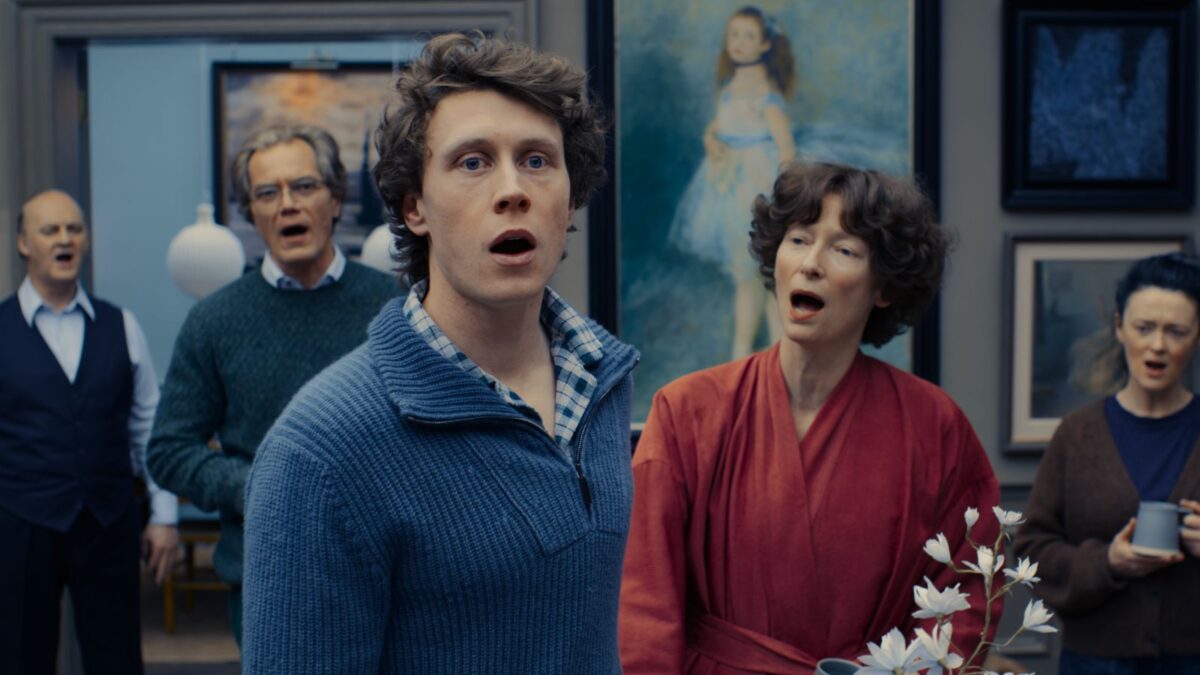
A decade after his staggering documentaries The Act of Killing and The Look of Silence, Joshua Oppenheimer has now returned, but this time with a narrative feature. In a rave from the premiere, Caleb Hammond said in his review, “From the jump, The End embodies a more classical filmmaking mode. Following an establishing shot of an unspeakably beautiful underground salt mine, a lush orchestral score plays over close-ups of oil paintings while opening credits roll. A remarkable level of craft is visible at once and maintained throughout the extended 148-minute runtime. This cohesiveness of vision across all departments with no visible lapses at any moment would be remarkable for a seasoned fiction filmmaker, let alone one making his first foray into narrative-feature storytelling.”
5. The Room Next Door (Pedro Almodóvar; Dec. 20)
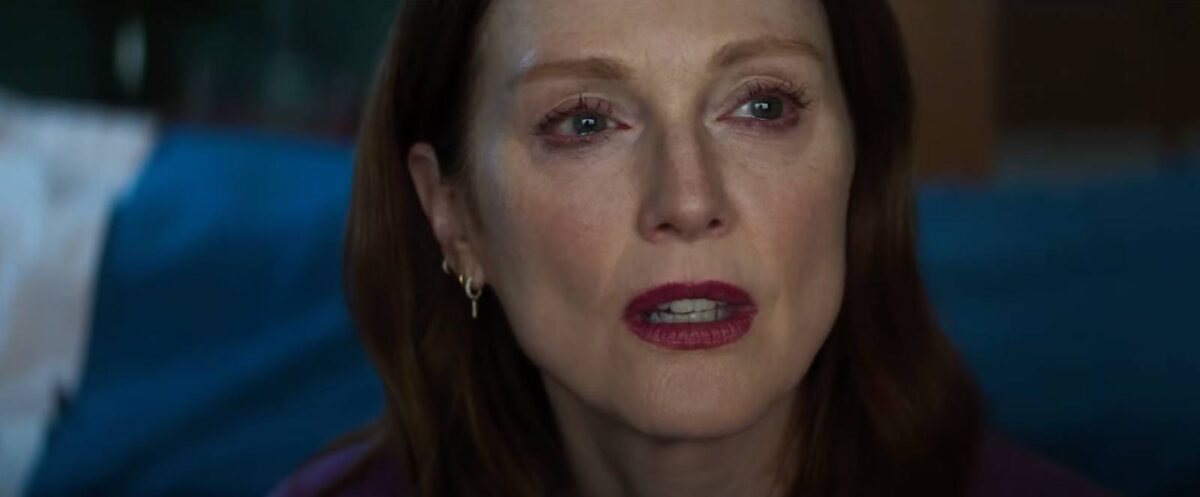
The warmest and lightest film about death is quite an accomplishment. Pedro Almodóvar’s English-language feature debut The Room Next Door brings together Julianne Moore, Tilda Swinton, John Turturro, and Alessandro Nivola in the adaptation of Sigrid Nunez’s rich, witty, heart-aching novel What Are You Going Through. Rory O’Connor said in his review of The Room Next Door, “Speaking as someone who strayed from the Almodóvar flock some films ago, The Room Next Door presents a welcome surprise. His recent output of shorts and medium-length films (Strange Way of Life and The Human Voice) pointed towards a director paring down in all the wrong ways. The Room Next Door is the other kind, the closest he’s come to an exercise in late style: it’s succinct, light on its feet, totally earnest, and––in spite of some indulgent conversations on art and writing––never feels like it’s trying too hard. Would an artist who felt they still had something to prove write a scene like the one in which Martha stares out the window of her hospital room, quoting Joyce while pink snowflakes gently fall over the Manhattan skyline? That the sequence works is as much a testament to the strength of the performances (watch out for Moore’s close-up in the scene, a real classic of the genre) as it is to the director’s conviction.”
4. Nosferatu (Robert Eggers; Dec. 25)
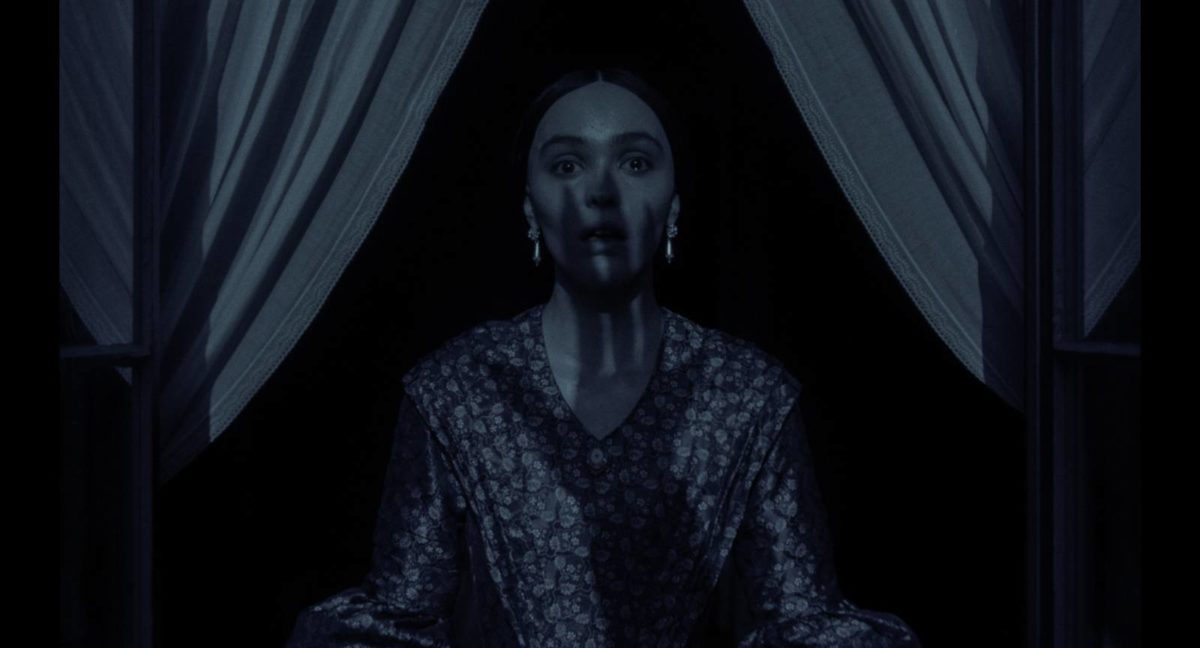
With imagery quite literally conjured from the deepest bowels of darkness, it’s clear why Nosferatu has been on the mind of Robert Eggers since he saw F. W. Murnau’s silent classic at the impressionable age of nine. The director’s fourth feature is his most assured and accomplished, an impeccably crafted, knowingly humorous, and perhaps too-rigid odyssey into the depths of true evil, one in which you can feel Eggers’ obsessions flow through every nocturnal frame. While The Northman was evidence he could work in a bigger playing field, his latest is the ideal marriage of focused, character-driven frights of his first two features and the imaginative world of his Viking epic, where no detail was left unconsidered. As Nosferatu relates to the vampire tales that have come before, from Murnau to Herzog to Coppola, the experience isn’t seeing how the director reinvents the wheel of the storied myth, but precisely how he honors this timeless myth with an exacting, full-bodied vision in all its evocative, erotic, and gory gothic horror. Continue reading my review.
3. The Brutalist (Brady Corbet; Dec. 20)
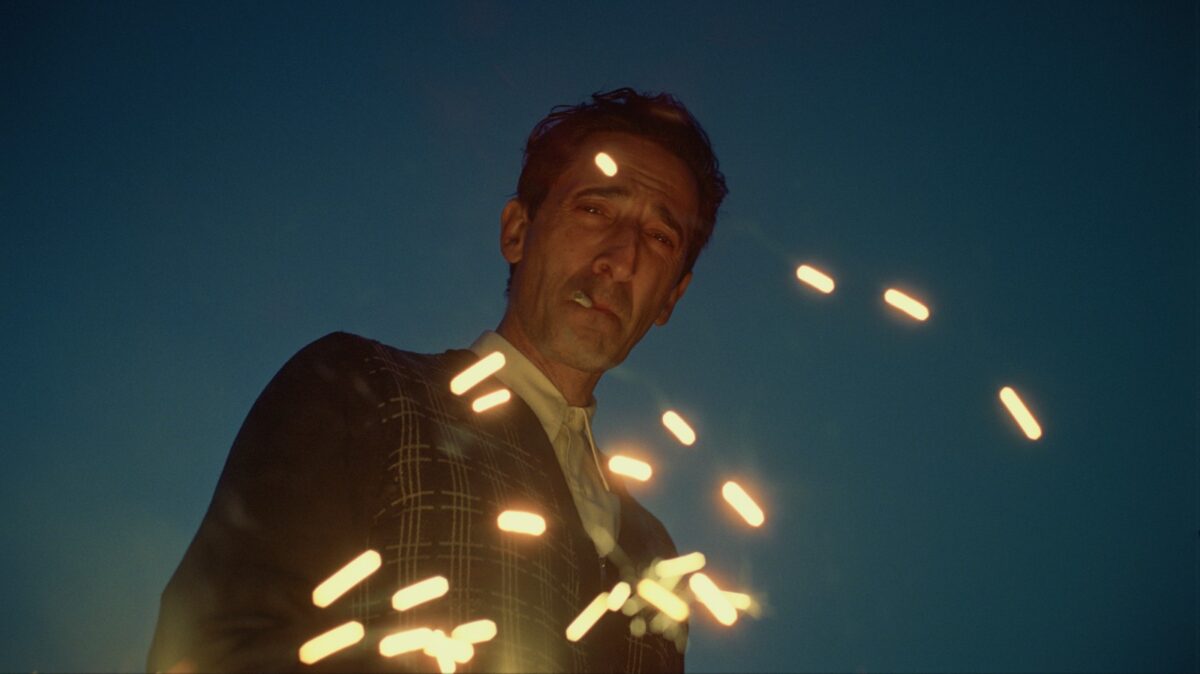
Certain to be crowned the most ambitious cinematic undertaking in independent filmmaking this year, Brady Corbet’s The Brutalist is a drama of epic proportions. At 215 minutes, with a 15-minute intermission, shot on VistaVision, and presented on 70mm (if you’re lucky), Venice’s Best Director winner will now get a release this month. As Rory O’Connor said in his review, “In Corbet’s miraculous introduction, a musical overture is disrupted by a dizzying climb: first Brody’s face, enveloped in shadows in the belly of a ship, then a race to the deck with Lol Crawley’s 70mm camera barely keeping pace. For a few dark moments it’s difficult to make out what’s going on––then, all of sudden, the score surges, the men reach clear sky, embracing as the Statue of Liberty breaks into the frame from above them, the New World turned upside-down. Mere moments in, we are already given a taste of what Corbet’s film will ultimately say about the American dream. For the opening act, Tóth moves in with his assimilated cousin (Alessandro Nivola), who already sports a new name and religion, and begins work in his furniture shop but soon gets the feeling that his modernist sensibilities may not be welcome. The relationship with Van Buren (who he meets after being given a chance commission to refurbish his library, producing a light-filled space that makes the pages of Life magazine) offers hope of artistic freedom and upward mobility; but soon ego, envy, and xenophobia rear their ugly heads. Corbet allows this mood to slowly fester away, building to a metaphor that is about as vulgar as it is cruelly effective. It is probably best to leave it there.”
2. It’s Not Me (Leos Carax; Dec. 10 on The Criterion Channel and in theaters)

A very welcome surprise before the end of the year, Leos Carax’s stunning cine-memoir It’s Not Me––packing more ideas into 40 minutes than almost any other feature this year––is getting a release this month, coming to theaters in NY and LA as well as arriving on the Criterion Channel. As Savina Petkova said in her review, “It’s Not Me boasts an eclectic visual style, fully embracing various ratios, formats, and stock conditions that come with the original materials used to assemble a cine-essay. The Carax works used are, of course, restored and pristine, and so are many other French films evoked by a frame or two; what is left unsaid are the levels of access such a big name has, and how little his team needs to worry about clearing copyright (unlike the mortal film essayists). This new project is a reflection on 40 years of directing––since the Cannes Critics Week premiere of Boy Meets Girl in 1984––that manages to keep a sober tone and eschew nostalgia (largely). There is also some new footage shot specifically for the purpose, the camerawork of course entrusted to Caroline Champetier (Holy Motors, Annette), as well as some personal archive bits where Carax records his young daughter on Pont Neuf.”
1. Nickel Boys (RaMell Ross; Dec. 13)
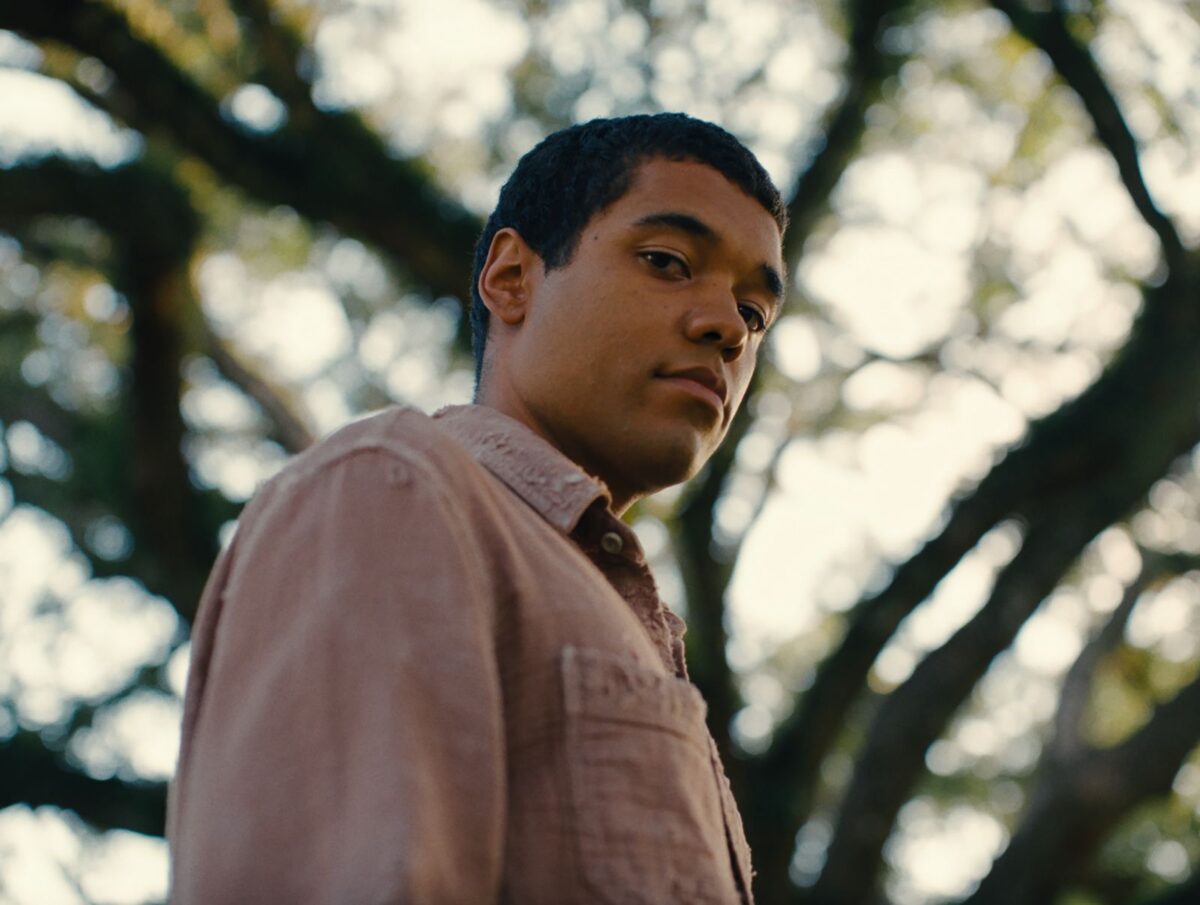
There are only a few films this year that truly feel like they are radically advancing the language of cinema; RaMell Ross’ narrative debut Nickel Boys certainly stands among them. After crafting one of the most remarkable documentaries of the last few years with the Apichatpong Weerasethakul-backed, Sundance-winning, Oscar-nominated Hale County This Morning, This Evening, Ross has now adapted Colson Whitehead’s acclaimed, Pulitzer-winning 2019 novel. With cinematography from Jomo Fray, who shot last year’s stunning All Dirt Roads Taste of Salt, Nickel Boys sees Ross exude stunning formal power once again, telling this story with a unique, empathetic conceit that makes for a radical adaptation and one of the year’s best films. Jourdain Searles said in her review, “Nickel Boys is a difficult film to define or boil down to constituent pieces. It feels alive like an open, bleeding heart. It’s a tragic story told with hope that doesn’t ring saccharine or overwrought. Sometimes it moves like water, flowing from ugliness to beauty. There are few American films that come close to what it accomplishes, as either film or adaptation. Nickel Boys suggests a miracle, with the makings of a classic.”
More Films to See
- The Taste of Mango (Dec. 4)
- Nightbitch (Dec. 6)
- The Return (Dec. 6)
- Lake George (Dec. 6)
- Sujo (Dec. 6)
- Y2K (Dec. 6)
- Unstoppable (Dec. 6)
- Wallace & Gromit: Vengeance Most Fowl (Dec. 18)
- The Count of Monte Cristo (Dec. 20)
- The Fire Inside (Dec. 25)
- Better Man (Dec. 25)
- 2073 (Dec. 27)
